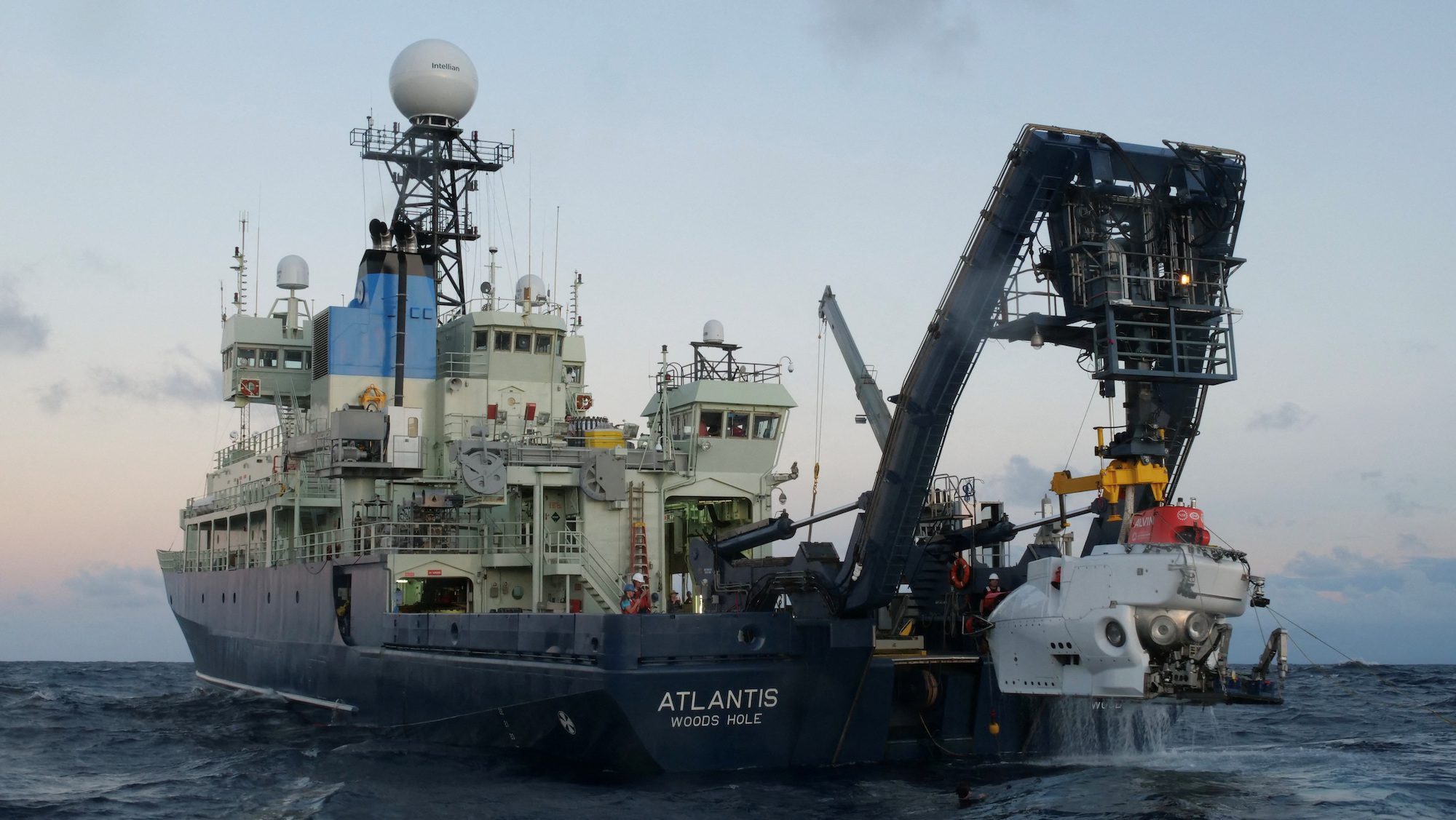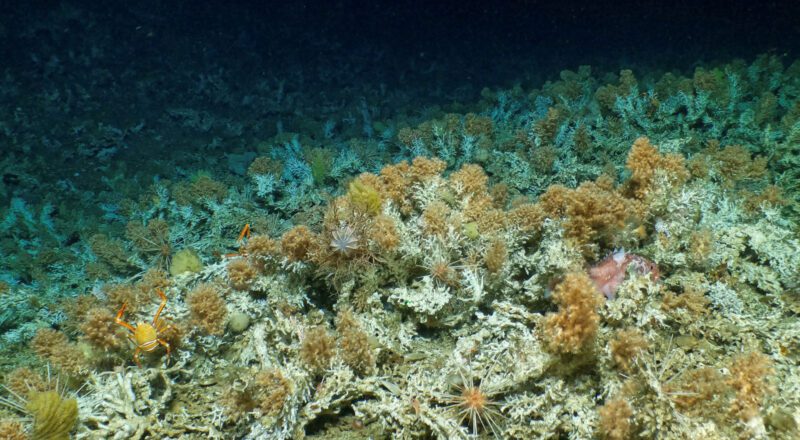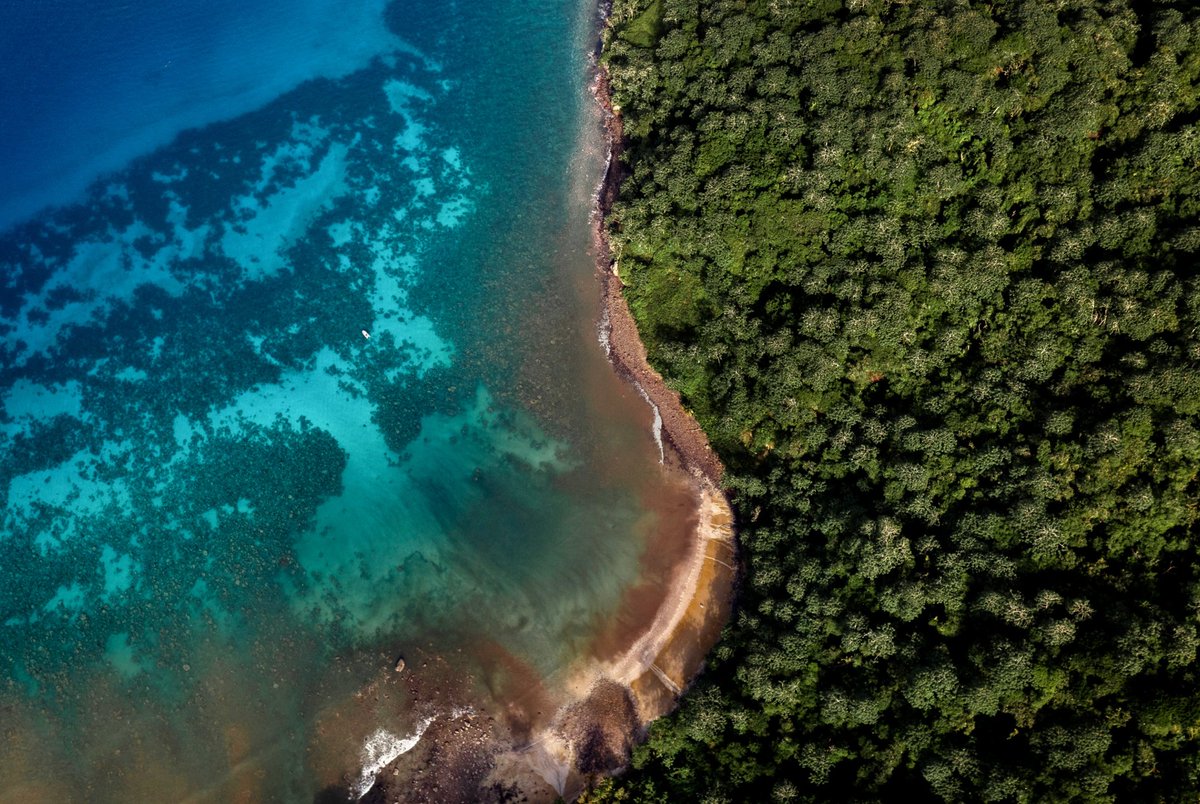Latin America
Related: About this forum'Extensive' Deep-Sea Coral Reef Discovered in Galpagos Marine Reserve

The R/V Atlantis and the research submarine Alvin are pictured in the Galapagos Islands, Ecuador November 11, 2021. UBristol/WHOI/UEssex/UBoise/NERC/NSF/National Park Galapagos/Handout via REUTERS
Mike Schuler
April 17, 2023
Scientists have announced the discovery of an extensive deep-sea coral reef in Ecuador’s Galápagos Marine Reserve, marking a first-of-its kind discovery in the marine reserve.
The undocumented reefs were discovered at a depth of 1,310 to 1,970 feet on the summit of a previously unmapped seamount in the central part of the protected area.
Researchers with the National Science Foundation described the “ancient” deep-sea coral reefs as being host to “a breathtaking mix of deep marine life” and the first of their kind to be documented since the Galápagos Marine Reserve was established in 1998.
Encompassing some 51,000 mi² off the coast of Ecuador, the Galápagos Marine Reserve is one of the world’s largest marine protected areas and is known for its vast biodiversity, including many species that unique to the area.
The reef’s structure spans several kilometers, cresting the ridge of a previously uncharted submerged volcano.

A view of an ancient and pristine coral reef discovered by a scientific expedition in the depths of the Galapagos Islands, in Ecuador, is pictured in this undated handout photo obtained by Reuters on April 17, 2023. UBristol/WHOI/UEssex/UBoise/NERC/NSF/National Park Galapagos/Handout via REUTERS
More:
https://gcaptain.com/extensive-deep-sea-coral-reef-discovered-in-galapagos-marine-reserve/
Judi Lynn
(160,542 posts)Dan Collyns
@yachay_dc
Tue 18 Apr 2023 07.54 EDT
. . .
Scientists operating a submersible have discovered deep-sea coral reefs in pristine condition in a previously unexplored part of the Galápagos marine reserve.
Diving to depths of 600 metres (1,970ft), to the summit of a previously unmapped seamount in the central part of the archipelago, the scientists witnessed a breathtaking mix of deep marine life. This has raised hopes that healthy reefs can still thrive at a time when coral is in crisis due to record sea surface temperatures and ocean acidification. It also showed the effectiveness of conservation actions and effective management, they said.
“They are pristine and teeming with life – pink octopus, batfish, squat lobsters and an array of deep-sea fish, sharks and rays,” said Dr Michelle Taylor, a marine biologist at Essex University and co-leader of the expedition in a human-occupied vehicle, HOV Alvin, a submersible able to take two scientists to depths of 6,500 metres.
“This is encouraging news,” said José Antonio Dávalos, the environment minister for Ecuador, which owns the Galápagos. “It reaffirms our determination to establish new marine protected areas [MPAs] in Ecuador and to continue promoting the creation of a regional marine protected area in the eastern tropical Pacific.”
The country is collaborating with its northern neighbours Panama, Costa Rica and Colombia on a regional marine corridor initiative, which aims to protect and responsibly manage the ocean.
More:
https://www.theguardian.com/environment/2023/apr/18/scientists-discover-pristine-deep-sea-galapagos-reef-teeming-with-life
Hope absolutely every measure will be taken to enforce total protection of this area. There just aren't second chances.
Judi Lynn
(160,542 posts)In 2021, Costa Rica made headlines when it committed to increasing protection for the waters surrounding Cocos Island National Park. In reality, things are far more complicated.
BY MONA GABLE
April 17, 2023
In the aquamarine seas some 330 miles off Costa Rica’s Pacific coast lies one of the most pristine islands on Earth. Spanning nine square miles, the rectangular landmass is called Isla del Coco, or Cocos Island. A cloud forest breathes there. Waterfalls pour from jagged cliffs into rushing rivers, and rain-soaked jungles shelter some 400 insect species and 156 species of birds, including the endemic Cocos finch. In 1978, Costa Rica declared Cocos Island and its surrounding waters a national park. Today, it is uninhabited except for the park rangers, paramedics, and volunteers who live there. It is so remote that, aside from the pigs, deer, cats, and rats that humans brought to the island starting in the 16th century, it has no native mammals.

In December 2021, Costa Rica committed to expanding Cocos Island National Park to 27 times its original size.Photo by Katie Orlinsky
Cocos is even more revered for its spectacular marine life. Within its cold, nutrient-rich underwater corridors, where two currents collide, hundreds of species such as manta rays and sea turtles float and flit. The biggest stars of Cocos Island, however, are its sharks. Sometimes called “Shark Island,” it sits amid seas containing some of the largest schooling populations of critically endangered scalloped hammerhead sharks; its waters also support the gigantic whale shark, and tiger, thresher, and silky sharks. The legendary French ocean explorer Jacques Cousteau, who made countless dives into the turbulent currents surrounding Cocos starting in 1976, reportedly called it the “most beautiful island in the world.” UNESCO, which named Cocos Island National Park a World Heritage site in 1997, states it has “irreplaceable global conservation value, reminding us what parts of tropical oceans historically looked like.” Renowned marine biologist Sylvia Earle, founder of the nonprofit Mission Blue, declared Cocos Island one of her Hope Spots for ocean conservation.
In December 2021, the island made environmental news: Costa Rica would expand Cocos Island National Park to 27 times its original size. With that, Costa Rica’s endangered sharks—one of the most important creatures in the ocean’s wild web of life—could flourish, their migratory paths to the Galápagos and other areas protected from poaching, overfishing, and pollution. Combined with the Bicentennial Marine Management Area (BMMA), the expansion would protect more than 62,000 square miles.
Ocean activists everywhere rejoiced. Costa Rica would be one of the first countries to contribute to the United Nations’ goal of safeguarding 30 percent of the planet’s seas by 2030. (To achieve this, the U.N. proposes that each ocean-adjacent country reserve 30 percent of its waters for conservation; less than 8 percent of the world’s oceans are currently protected.) Just the month before, at the U.N. Climate Change Conference, four countries—Costa Rica, Panama, Colombia, and Ecuador—made headlines, vowing to jointly preserve at least 125,000 square miles in the Eastern Tropical Pacific, a biodiversity hot spot. As someone who loves the water, I, too, was excited by the news.
More:
https://www.afar.com/magazine/how-costa-ricas-shark-island-is-changing-marine-conservation